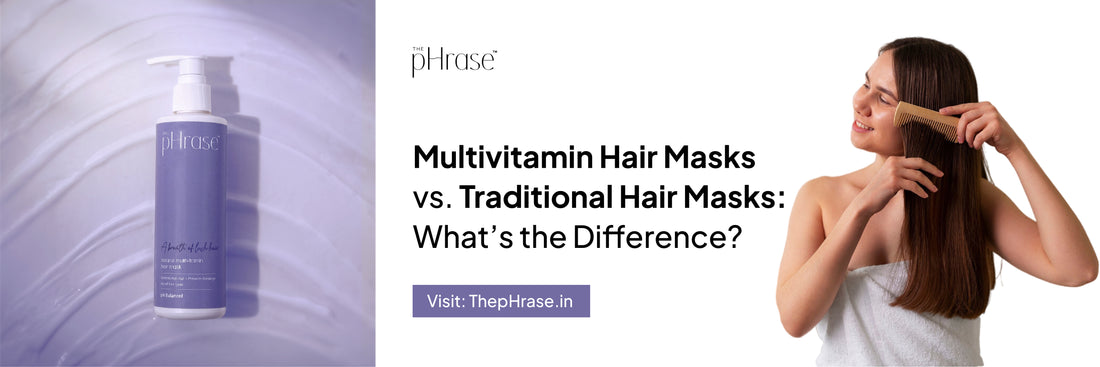
Multivitamin Hair Masks vs. Traditional Hair Masks: What’s the Difference?
Share
When it comes to maintaining luscious, healthy hair, hair masks have become a crucial part of many people's hair care routines. But with the plethora of options available, it can be challenging to determine which type of hair mask is best for your hair. Two popular choices are multivitamin hair masks and traditional hair masks. In this article, we will explore the differences between these two types of hair masks, their benefits, and which one might be the best fit for your hair needs.
Understanding Hair Masks
Hair masks are deep conditioning treatments designed to nourish, strengthen, and repair hair. They typically contain higher concentrations of active ingredients compared to regular conditioners, providing intensive care for damaged or dry hair. Hair masks can be formulated with a variety of ingredients, from natural oils and botanical extracts to synthetic compounds designed to target specific hair concerns.
Traditional Hair Masks
Traditional hair masks have been a staple in hair care for years. These masks often contain ingredients such as proteins, oils, and silicones that help to repair and protect the hair. Common ingredients found in traditional hair masks include:
- Proteins: Such as keratin and silk protein, which help to strengthen and repair the hair shaft.
- Natural Oils: Including coconut oil, argan oil, and olive oil, which provide deep hydration and nourishment.
- Silicones: Which create a protective barrier around the hair, adding shine and reducing frizz.
Benefits of Traditional Hair Masks
- Deep Hydration: Traditional hair masks are excellent at providing intense moisture to dry and damaged hair.
- Strengthening: The proteins in these masks help to strengthen weak and brittle hair, reducing breakage.
- Protection: Silicones and oils can create a protective layer, shielding hair from environmental damage and heat styling tools.
Multivitamin Hair Masks
Multivitamin hair masks are a newer innovation in the hair care world. These masks are formulated with a blend of essential vitamins and minerals that are vital for healthy hair growth and maintenance. The pHrase offers a Multivitamin Hair Mask for Dry, Damaged Hair, which includes a range of vitamins to rejuvenate hair quality and support scalp health.
Key Ingredients in Multivitamin Hair Masks
- Vitamins: Such as A, B, C, D, and E, which help to nourish the scalp and hair, promoting healthy growth.
- Natural Extracts: Including botanicals like aloe vera and chamomile, which soothe and hydrate the scalp.
- Proteins and Amino Acids: Which strengthen the hair shaft and promote elasticity.
Benefits of Multivitamin Hair Masks
- Comprehensive Nourishment: Multivitamin masks provide a broad spectrum of nutrients that are essential for overall hair health.
- Scalp Health: These masks not only nourish the hair but also improve scalp health, reducing issues like dandruff and inflammation.
- Balanced pH: Formulated to restore the natural pH balance of the scalp and hair, preventing dryness and oiliness.
- Suitable for All Hair Types: Multivitamin hair masks can be used by people with straight, wavy, or curly hair, as well as those with dry, oily, normal, or sensitive scalps.
According to market research, the global hair mask market is expected to reach $886.4 million by 2026, growing at a CAGR of 5.1%. This growth is driven by increasing consumer awareness of hair health and the benefits of using intensive hair care treatments. In India, the demand for natural and multivitamin hair care products is rising as consumers seek out safer and more effective solutions for their hair problems.

Image source: https://www.alliedmarketresearch.com/hair-mask-market
Choosing the Right Hair Mask
When deciding between a multivitamin hair mask and a traditional hair mask, consider your specific hair needs and concerns:
- For Dry and Damaged Hair: If your hair is dry, damaged, or frizzy, a traditional hair mask with natural oils and proteins can provide the deep hydration and repair you need.
- For Overall Hair and Scalp Health: If you want to improve your scalp health and provide comprehensive nourishment to your hair, a multivitamin hair mask is an excellent choice.
- For Regular Use: Multivitamin hair masks are generally formulated to be gentle enough for regular use, making them suitable for maintaining long-term hair health.
How to Use Hair Masks
- Cleansing: Start with clean, shampooed hair to remove any buildup and allow the mask to penetrate effectively.
- Application: Apply the hair mask evenly from the mid-lengths to the ends of your hair. Avoid applying directly to the scalp unless specified by the product.
- Waiting Time: Leave the mask on for the recommended time, usually between 5 to 30 minutes, to allow the ingredients to work their magic.
- Rinsing: Rinse thoroughly with lukewarm water to remove all product residue.
- Conditioning: Follow up with a conditioner if necessary to seal in moisture and add extra softness.
Product Recommendation
For those looking to improve their hair health, consider trying the Multivitamin Hair Mask for Dry, Damaged Hair by The pHrase. This mask is formulated with essential multivitamins that nourish, rejuvenate, and restore the pH balance of your scalp and hair. It is suitable for all hair types and provides deep hydration without weighing your hair down.
FAQs about Hair Masks
- Can I use a hair mask every day? The pHrase Multivitamin Hair Mask has a conditioner-like consistency, making it gentle enough for daily use.
- Should I use a hair mask before or after shampooing? It's best to use the hair mask after shampooing for optimal absorption and effectiveness.
- How long should I leave a hair mask on? Leave the hair mask on for 5 to 30 minutes, depending on the product's instructions.
- Can hair masks help with hair growth? Yes, hair masks with vitamins and proteins can promote healthier hair growth by nourishing the scalp and strengthening the hair.
- Do hair masks weigh hair down? The pHrase Multivitamin Hair Mask is designed to be lightweight and won't weigh your hair down.
- Are hair masks suitable for all hair types? Yes, the pHrase Multivitamin Hair Mask is suitable for straight, wavy, and curly hair, as well as all scalp types.
- What are the benefits of using a multivitamin hair mask? Multivitamin hair masks provide comprehensive nourishment, improve scalp health, and restore pH balance.
- How often should I use a hair mask? Depending on your hair's needs, you can use a hair mask once a week or more frequently if needed.
Ready to transform your hair care routine? Discover the benefits of multivitamin hair masks at The pHrase. Our Multivitamin Hair Mask for Dry, Damaged Hair provides the nourishment and care your hair deserves. Visit The pHrase today and take the first step towards healthier, more beautiful hair!
In conclusion, both multivitamin hair masks and traditional hair masks have their unique benefits. Understanding your hair's needs and choosing the right type of mask can make a significant difference in achieving and maintaining healthy, beautiful hair.

